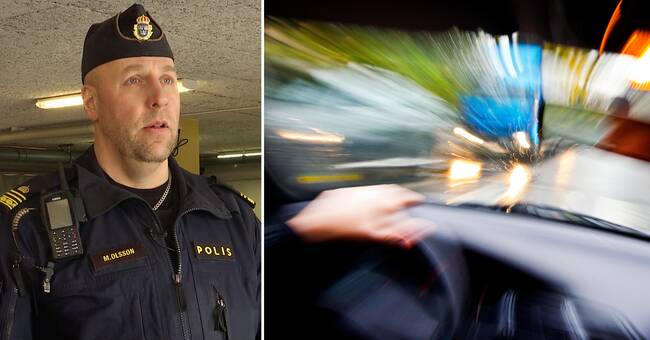In the clip above, he tells more about the explanations they can hear from people who drive drunk - and why he thinks so few say yes to help.
With the SMADIT method, collaboration against alcohol and drugs in traffic, the police can offer contact with the social services only a few hours from the time the person blew positive in a breath test or if there is a suspicion of drug exposure.
In this way, people with alcohol or drug abuse can begin voluntary treatment - long before they are convicted of drunk driving and may be forced to go to the prison service's treatment program.
One percent take help
Previous studies show that a fifth of all respondents say yes to SMADIT, but this is not the case everywhere in the Bergslagen Police Region.
Örebro has the best results, where ten percent of all drunk drivers caught contacting the social services through SMADIT in 2020, and 27 percent in January and February.
In the spring of 2020, less than one percent in Värmland said yes and in Dalarna, no county-wide statistics are kept, but according to the Dalarna Region, a handful of people are locked up every year.
The Motor Drivers' Association believes that the police can become better at motivating drunk drivers to seek help, and to actually remember to ask if they want help.
- We can probably develop the work that is done, states Morgan Olsson.
"Send everyone to the social services"
However, he wishes there were more compelling elements in this voluntary method.
- In the best of worlds, we send everyone to the social services and then they get to investigate whether the individual wants help or not, says Morgan Olsson.
In Örebro County, there is already that coordination, to some extent.
In some of the local police areas, it is the medical staff who take the motivational call, in other parts it is the police who do it.
Direct report · Influenced drivers on our roads - what have you been through?
Post
Javascript needs to be enabled in your browser for this instant report to be updated automatically.
1 day 06.47
Good morning!
This week, SVT in Örebro, Värmland and Dalarna draws attention to the problems with drug driving and drunk driving on the roads in the Bergslagen police area.
Have you been through something you want to tell?
Then feel free to write about this in our chat.
Do you want a reporter to contact you?
Then also write in our form.
SVT · Anna Wikman
7 tim22.52
One can not really understand how we can have such incredibly low penalties for things like this.
There is something that is COMPLETELY wrong with the punishment.
You see the culprits live freely in the city again after a very short time locked up and live on as before they got stuck.
How many will be allowed to drive to death?
Please do something
SN
9 tim21.11
A drug addict sitting inside can not kill anyone, much longer prison sentence please!
Nisse
10 tim20.21
The situation is fantastic compared to 40 years ago
alexander
10 tim19.58
I would like to point out one important thing when it comes to traffic offenses: it is also a political issue that needs to be resolved here.
It is not automatically the case that it is only a police matter to solve the problem of traffic offenses.
The judiciary is also handcuffed to, for example, the problem of repeat offenders when it comes to traffic offenses.
There is a need for an urgent political solution to the problem of affected drivers and also repeat offenders.
One must realize that the car becomes a murder weapon in the hands of affected and inappropriate car drivers.
This is not just about grossly irresponsible and indifferent behavior when you drive everything to death.
severely harms other people.
It can also be about highly deliberate and intentional crimes that are committed, similar to other criminal classifications such as murder.
I think this is forgotten in the debate.
Naivety is great when traffic offenses are discussed.
No one would think of saying, for example, that an 'ordinary' murder would be 'irresponsible' or would have taken place out of 'negligence'.
We need to change our view of who traffic criminals really are: serious criminals who constantly relapse into crime.
Carin
11 tim19.18
Treat drug and drunk drivers equally.
Make a difference today.
Conny
11 tim18.56
Hi.
You have noticed how cars swayed and thought they were looking at their mobile.
But whether they are under the influence of alcohol or drugs is not up to me to judge.
On the other hand, when I drive to Örebro from Karlskoga, it drives fast.
From Karlskoga to the motorway there are 100 kilometers but there are few that hold.
And on the motorway, which is 110, people drive over 150 km / h.
Most often, it is people down expensive new cars.
So you should do it.
Check them out.
Personally, I think it's nice to drive at a speed that does not make driving uncomfortable.
You want control over the vehicle.
Not the other way around.
Maria
12 tim17.59
Fines should be adjusted according to income, the right to appeal the police traffic fine should be reviewed.
/ Epan
Invest in the Traffic Police as an organization.
14 tim16.06
Traffic is my work environment and it is currently not acceptable!
We must have penalties that mark how wrong drugs are and not least in traffic.
Mats Nilsson Salesman, travels all over Sweden
17 tim12.31
Drive with a dashcam forwards and backwards, maybe 45-60 minutes of material a week with "doubtful drivers", this only from the stretch karlskoga-örebro and a little city driving in both cities per day.
Originally from the west and has moved here, and for my world can not understand how talentless drivers are here in general.
Otherwise

